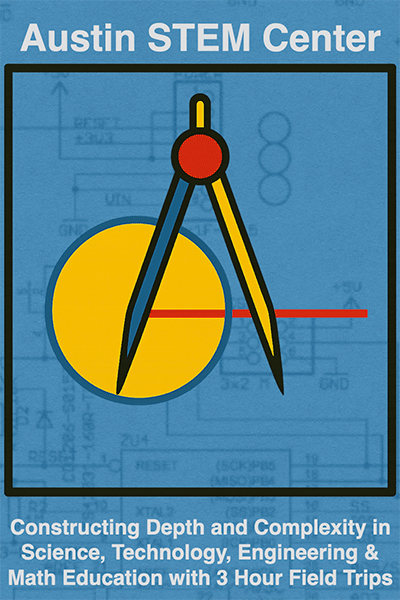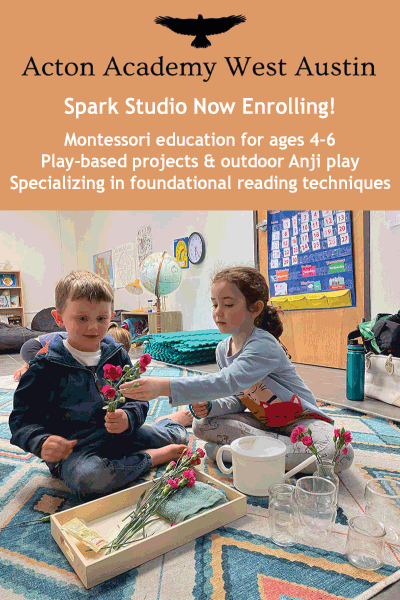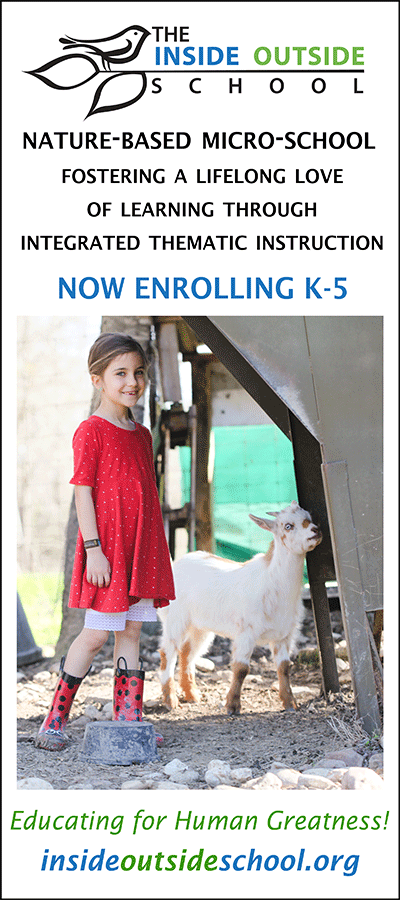Talking with children about the coronavirus
/Marie Catrett is a longtime early childhood teacher who has been contributing her shining light and insights to the Alt Ed Austin blog since 2012. She uses daily documentation to record children’s learning, support children’s interests, teach with intention, connect families to the journey, and share her work with other folks who might be interested in a playful, creative, and expressive early childhood experience. You can find more of Marie’s writings on her own blog, Guidance for Grownups.
This class has a tradition of beginning with a time for the children to share joys and concerns. They call this their “roses and thorns.” Children share about being very proud about tying their own shoes for the first time, excitement for an upcoming Frozen 2 birthday party, the sad news of a neighbor’s dog who died. After the children’s shares I say I have a thorn to say about because I am thinking about the coronavirus.
I give a long pause. Everyone is listening now. Really listening, the kind of listening you do when someone names out loud a heavy thing that you too are carrying. We don’t have to hold hard things all alone.
It is early days here in our community. As I write this, we have no confirmed cases yet, but it is everywhere in the news. Kids hear things. They read our worried faces. In my years of talking with children about hard topics they always know when something is up. Just talking about getting the regular kind of sick is important because young children need to see that they get better!
My strategy here is to let all the children speak first, and then I take my turn.
Marie: I wanted to make a time for us today to talk about the coronavirus and anybody who wants to share about it, we’d love to hear your words. I have some thoughts to share with you, too.
—-I actually have way more happy things.
Marie: Well, we can definitely make time to hear more about happy things too. I know it can be hard to talk about big things sometimes.
—And I’m getting strong!
Marie: I’m so glad. And I think it can be so good to have time to talk about worries. Did anybody want to say about coronavirus?
—I know that it is going around the world.
Marie: Mmm, anybody else hear about that?
—The coronavirus is at the front of my school. At the doors. And at the front. And on the handles. Maybe you have to go to a new school on a bus.
Marie: You’re saying you are worried about your school.
—Yeah.
—The coronavirus is bad for you.
Marie: Has anybody else heard about that?
—It’s kind of killing people a little bit.
Marie: Yeah, hearing that sounds pretty scary.
—Yeah!
—I heard that on cruise ships that more than one person had the coronavirus. And some people were starting to die and there was like an old man and an old woman and they didn’t have it but the doctors on the cruise ship were trying to keep them as healthy as possible. So they wouldn’t get it.
Marie: Mmhmm, that is so important, and this has been in the news, hasn’t it? A lot of talking about it.
—Yeah, and you have to wash your hands. For at least twenty seconds!
Marie: Yeah. So, some of this is a lot like the flu. Do you know about the flu?
Kids: Yes!
Marie: Have you ever gotten sick with something like the flu? Your tummy doesn’t feel good, you have a fever, maybe you throw up.
—My brother had the flu.
—I got the flu one day and then I throwed up in my bed!
Marie: Oh, yes, and I remember you talked about that before. And how are you feeling now? Do you have the flu now? Do you feel sick now or are you feeling better?
—I’m kind of feeling sick now because my sister put a toy car in my mouth!
Marie: Ah, that happened, and you didn’t like it. You didn’t feel good about it.
—I throw up in my mouth. Sometimes.
Marie: We all get sick sometimes, don’t we?
—But I never got the flu!
—Well my brother did throw up one time. My brother threw up all over the car!
Marie: Oh yes, well that can happen. You sure notice when somebody is sick don’t you? Well, is your brother sick today or is he feeling better?
—He’s not even sick.
Marie: Okay good, he’s feeling better. Yes, so, our bodies are so good at getting better. Most almost all the time when you get sick you get better.
—Except when you get the coronavirus.
—Sometimes it gets better?
—Maybe just for a few days you’ll be sick with it and then it’ll be gone.
Marie: You know some important things about this virus. Okay, here are some things I want to say about it. The coronavirus is a kind of being sick. It’s like, have you ever had a bad cold where you sneeze a lot and you might have a fever?
—Once I had a little cold!
—I had a cold one time. Every time my eyes get itchy! And my nose!
Marie: So, having a cold sometimes, getting sick sometimes, that is so normal. That happens to all of us. You get sick, you rest, your grownups take care of you. And maybe you need some medicine from a doctor to help your body get better.
—I had some medicine and it was bubble gum flavor.
—I have cherry medicine. It smells like my grandma.
—And medicine for allergies. Allergy medicine to help my eyes stop itching.
Marie: Yeah, we have so many ways to help people get better. What I wanted to say—what I want everybody to hear—with the coronavirus, people are getting sick from it. Almost all of those people are getting better and it is like having a bad cold. For some people—for people that are very old and very sick—they might have a harder time getting better from it and they might need to get more help from a doctor and going to the hospital. And some of those very very sick people, they could die from it. But for kids, and people that are healthy, which is most all of us, most of the time, for those people that get the coronavirus, it is like having a bad cold. And mostly you get better. But it’s not very fun to be sick. Right?
—No.
Marie: You rest a lot.
—But you also don’t get to go to school!
Marie: Yes, if you get sick you should stay home and not go to school.
—And you have to not be sick for one whole day before you go back to school.
—I have a doctor at my school, but all of the teachers and students call it going to the nurse.
Marie: Doctors and nurses know so much about helping people feel better. They are experts at helping us.
—If you didn’t have doctors and nurses you could die! Because you are very very sick.
Marie: We are so lucky, if someone we know gets very sick, we have doctors and nurses that can help. They have many good tools to help people get better. And if you are feeling worried about getting sick, or someone you know getting sick, because really nobody likes to be sick—
—Except when you get to stay home from school.
Marie (laughing) You don’t like to get sick, but you do like to get to stay home from school, are those your thoughts about it?
—Yeah.
—I stay home from school alllllll the time and then I play My Little Pony.
Marie: In my house we call that getting to have a hooky day. Sometimes even when you aren’t sick but you just feel like you need to have a day where you don’t have to do all the things you have to do and you just wanna play a video game and My Little Pony and wear pajamas all day and take a nap . . .
—I once did that!
—And my mom says get dressed, and I wouldn’t!
Marie: Oh, my goodness. Well, what I want to say is that if you are feeling worried about the coronavirus, please tell a grownup that you are feeling worried. So you can talk about it. So they can listen to you and think about it with you and listen to your questions. Because our job as your grownups is to think about how to help keep people safe and healthy, and so many grownups—especially doctors and scientists—are working really hard to figure out how to help people all over the whole world. Which is really good news. That is so many people coming together to make this better. Hooray for science!
—My mom is trying to be a nurse or a doctor.
Marie: Oh, that is really wonderful and exciting. We need grownups that care about helping people get better, like doctors and nurses, and like your mom.
Note: In reviewing our conversation I see that we did not address the xenophobia and racism that is accompanying people’s responses to this virus. Those are important topics to hit on in follow-up conversations for the group.
Additional resources:
After our group conversation, I told a handwashing story using a felt board I put together, inspired by the Two Little Hands Felt Story, followed by actual handwashing by all the children. So many birthday parties at the sink today!
Each child took home the printable book NPR has put together: Exploring the New Coronavirus: A Comic Just for Kids.
Marie Catrett
















